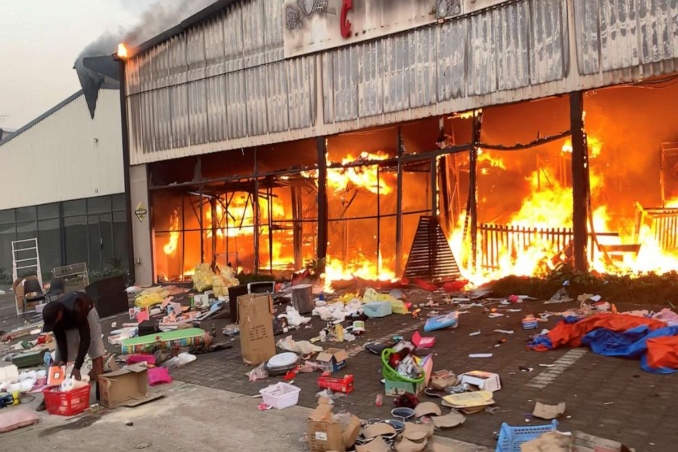Last updated on September 11th, 2021 at 07:56 am
South Africa is on its knees, and everything raises concerns that the situation will not improve anytime soon. That is the adage that is the most popular in South African newspapers these days, which tells of a nation that has gone far beyond the social breaking point.
A wound that, with the passing of the hours and the aggravation of the protests, risks being irremediable and for which South African politics bears an enormous responsibility along with criminal groups, the pandemic, and the resulting economic crisis.
The riots began in early July, following the arrest for corruption offenses of former president Jacob Zuma, who will have to serve a 15-month sentence. In addition to the semi-oligarchic and highly corrupt management of public affairs, proven by investigations and corrections not only against Zuma but against the entire South African political class, the political reaction to the sentence was violent.
With incitement to revolt by the Zuma supporters, including his daughter Duduzile Zuma-Sambudla and a local radio DJ named Ngizwe Mchunu, who poured fuel on the fire. Protests, violence, and looting still affect the provinces of KwaZulu-Natal and Gauteng, where the economic capital Johannesburg is located.
There are two main elements behind the protests: an “organized crime network that found opportunities in the incarceration of a political exponent,” as the director and journalist Richard Poplack writes in the Daily Maverick newspaper, and the instability caused by the desperation of a people crushed by corruption, which has become unsustainable due to the economic crisis caused by the pandemic and the restrictions imposed to protect public health.
A third element surrounds this explosive situation: the impotence of the police, which turned out to be unprepared for a similar scenario even though for years, the polarization of South African society and corruption at all levels have revealed the profound crisis at the foundations of the “rainbow nation.”
READMORE: Former US President Barack Obama joins NBA Africa as a strategic partner
Despite what it may seem from the outside, the violence is not accidental but follows an exact logic and, on closer inspection, very close to that which governs conflicts: violence has targeted the vital nodes of the distribution of goods first necessity. Logistics capacity in the Mooi River, local food and dry goods stores throughout eThekwini, large shopping centers, and warehouses along the coast to Pietermaritzburg.
The state insurance agency Sasria will have to cover part of the costs to repair the damage, which ultimately means that South African taxpayers will act as guarantors. But the economic ones will not be the only costs to be incurred: the entire South African supply chain is in check. According to many South African analysts, under cover of Zuma’s incarceration, the network of local gangsters has the opportunity to flex their muscles to the authorities and society: “We are here; stop us if you can.” The problem is that the response from the state has been bland, insecure, and late.
Zuma is a retired politician with no power. His consent has practically vanished with the end of the political experience. His family is not made up of genuinely influential and well-educated people willing to do anything to keep control over money and political power. Zuma’s political legacy is the problem, constituting the substratum of the protests: the ex-president ruled with a strongly “populist” rhetorical style but at the same time approaching the liberal and non-liberal elites of white society. That has attracted extreme criticism of the ANC, the former party of Mandela, which is not exempt from sensational corruption cases.
The South African crisis set the stage for chaos for a network of gangsters and oligarchs fighting for control of the economy. There is nothing to lose in South Africa today: the violence and looting want to eliminate everything, send a signal to the old economic and corporate monopolies, and create a void that will have to be filled sooner or later.
An example of this is the logistics sector in KwaZulu-Natal, currently completely blocked: the roads are under the control of criminal groups and well-organized armed gangs, which, according to many, are in the pay of real mafias. Who exploit disillusionment, hunger, anger, unemployment: those who loot today are part of an economic underclass that has been humiliated for generations and whose example has always been represented by a corrupt political class.

